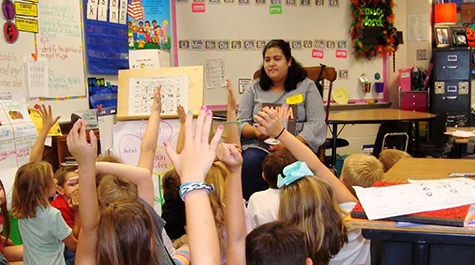School of Education launches new Bachelor of Arts in Education
Starting this fall, William & Mary undergraduates will have the opportunity to pursue a standalone degree in elementary education, with optional concentrations in ESL/bilingual and special education. The new degree option was created after the 2018 Virginia General Assembly approved legislation aimed at streamlining licensure requirements and combating a statewide teacher shortage.
“There are few professions that offer as much opportunity to change lives as teaching,” said Spencer Niles, dean of the School of Education. “We’re thrilled to offer this new degree option, which will allow more William & Mary students to pursue this important work.”
Previously, students have been required to either double-major in education and a liberal arts discipline or bridge to a fifth-year master’s program in education. The new Bachelor of Arts in Education (BAED) allows students to focus their studies in elementary education, while taking full advantage of the COLL curriculum and supplementing their schedule with courses that interest them.
“Double-majoring is difficult because in addition to fulfilling the course requirements for two majors, students must also fit in the field experiences that are crucial to their preparation as teachers,” said Leslie Grant, senior associate dean of academic programs. “This new option will make it much easier for students to graduate in four years and still be fully prepared to step into the classroom and begin teaching.”
After completing the BAED, students will be eligible for licensure in the state of Virginia with an endorsement in Elementary Education PK-6. Students who pursue the concentration in special education will be eligible for an add-on endorsement in special education, and students completing the ESL/bilingual concentration will be prepared to take the Praxis test required for the add-on endorsement in ESL/bilingual education.
The new program was one of only seven elementary education programs across the state to be approved by both the State Council of Higher Education for Virginia (SCHEV) and the Virginia Board of Education this summer.
In a press release announcing the new programs, Governor Ralph Northam said, “We must remain focused on meeting the growing needs of our public education system to prepare the Commonwealth’s students for success and secure Virginia’s economic future. As we work to strengthen Virginia’s educator pipeline, I am pleased to see the approval of these comprehensive changes that will create new pathways to the classroom and help increase both the supply and the diversity of quality teachers in the Commonwealth.”
Two state advisory panels—the Task Force for Diversifying Virginia’s Educator Pipeline in 2016 and the Advisory Committee on Teacher Shortages in 2017—recommended that Virginia allow new teachers to enter the profession with undergraduate degrees in education. The legislation approved by the 2018 General Assembly amended the Code of Virginia to allow colleges and universities to offer these undergraduate degrees.
Students may begin taking coursework in the new program this fall. Several courses are available to freshman and sophomore students who are interested in exploring education prior to declaring the major. A new 2-credit course, Orientation to Teaching, was developed specifically to allow students to have field experiences in K-12 classrooms and explore teaching as a profession before choosing a major in education.
Students interested in pursuing the BAED will formally apply to the School of Education during the second semester of their sophomore year. During the junior and senior years, students take coursework in curriculum planning, assessment and learning environments. The culminating course for the program is a 15-week student teaching experience in one of 46 partner schools. Throughout the school placement, students receive ongoing feedback from a cooperating mentor teacher, a supervising master teacher, and university faculty. They are concurrently enrolled in a seminar to discuss what they learn with fellow students in their cohort.
“All of our teaching programs are cohort-based, which allows our students to make deep and meaningful connections with fellow students and faculty,” said Mark Hofer, professor and chair of Curriculum & Instruction. “Having that strong sense of community and support is invaluable—these are relationships that often go far beyond graduation and anchor our alumni to a strong support network as they navigate the early years of teaching.”
Once the program is fully implemented, the school plans to confer 12 BAED degrees per year with 40 students enrolled in the undergraduate program at any given time. The school will continue to offer options for students to pursue elementary education as a second major, as a 5th year option, and as a separate master’s program. Additionally, undergraduates who are interested in educational issues but don’t wish to pursue licensure as a teacher can choose a Minor in Educational Studies.
“Our graduates are in high demand by school divisions in Virginia and across the nation,” said Niles. “I’m deeply grateful to the many faculty and staff members who worked so hard to fast-track the creation of this program. As a result, more talented William & Mary students will choose a career in education and go on to change countless lives through teaching.”
